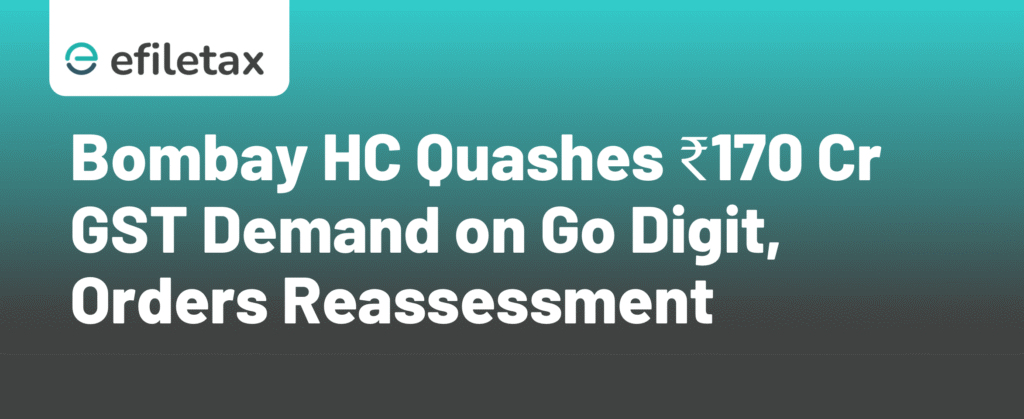
GST demand on Go Digit set aside: Bombay High Court’s ruling explained
The Bombay High Court has set aside a ₹170 crore GST demand raised on Go Digit General Insurance Ltd. The court cited serious procedural lapses, including violation of natural justice, and has ordered a fresh hearing.
Let’s break down the key legal and compliance insights from this ruling.
Why did the GST demand fail?
The ₹170 crore demand arose from a Show Cause Notice (SCN) issued to Go Digit.
However, the Bombay HC found that:
- The SCN was vague and lacked specifics
This led the Court to quash the demand and direct the department to issue a fresh SCN and provide due opportunity to the taxpayer.
Key provisions involved
| Legal Provision | Summary |
|---|---|
| Section 73/74 CGST Act | Powers of tax determination in cases of fraud or non-fraud |
| Section 75(4) | Mandates hearing opportunity if adverse order is proposed |
| Article 14 of Constitution | Guarantees fairness and equality before law |
| Rule 142(1A) | Requires proper communication of SCN contents |
What this means for taxpayers
If you receive a GST notice:
- Demand full disclosure of relied-upon documents
- Insist on hearing rights under Section 75(4)
- Use judicial precedents to contest procedural violations
This judgment reinforces that GST demands must follow due process.
Expert view
“GST demands without clear notice and proper hearing violate both statutory and constitutional protections. This ruling reaffirms that procedural compliance is not optional for the department,”
— A leading GST counsel at Bombay HC
Practical checklist for businesses
Here’s what to do if you receive a SCN under GST:
- ✅ Verify if SCN mentions specific tax periods, invoices, or sections
- ✅ Ask for copies of audit reports or third-party evidence relied upon
- ✅ Demand a personal hearing as per Section 75(4)
- ✅ File a detailed reply with legal backing
- ✅ Keep record of acknowledgements and replies filed
Similar cases where GST demands failed
| Case | Reason for Quashing |
|---|---|
| Mohit Minerals v. UOI | SCN beyond limitation period |
| M/s Nanhey Mal Munna Lal | Improper service of notice |
| Bharti Airtel Ltd. | Discrepancies in ITC claim clarified by audit, not fraud |
Subheading with keyphrase
GST demand on Go Digit: Legal implications and learning
This judgment serves as a strong reminder: GST demands are not enforceable if the foundational procedure is flawed. From SCN to final order, every step must follow statutory guidelines.
Final takeaway
Taxpayers must actively defend their rights when facing GST notices. The Bombay HC’s quashing of Go Digit’s ₹170 crore GST demand shows that courts won’t tolerate shortcuts in procedure.
FAQ
Q1: What is Section 75(4) of CGST Act?
It mandates that if an adverse decision is likely, the taxpayer must be given a personal hearing.
Q2: Can a vague SCN be challenged in court?
Yes. Courts have repeatedly held that vague notices with no specifics violate natural justice.
Q3: What happens after a demand is quashed?
The department may reissue a fresh SCN, but must follow due process this time.
Q4: Is Go Digit completely off the hook now?
No. The case is remanded for fresh adjudication, not a full acquittal. But the earlier demand is invalid.
Summary
Bombay HC quashed a ₹170 crore GST demand on Go Digit citing violation of natural justice. The court found the SCN vague and ordered a fresh hearing. This case reminds taxpayers to challenge defective notices and insist on due process under GST law.
CTA:
Facing a GST notice or unclear SCN? Let Efiletax handle it for you — expert replies, documentation, and appeal support.